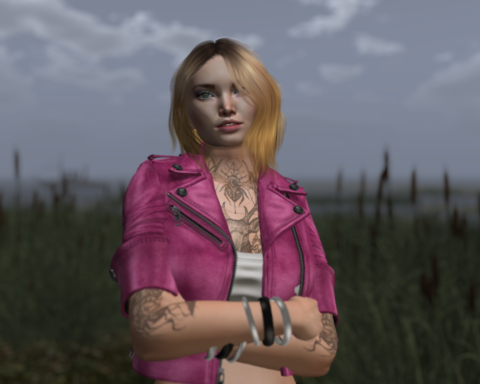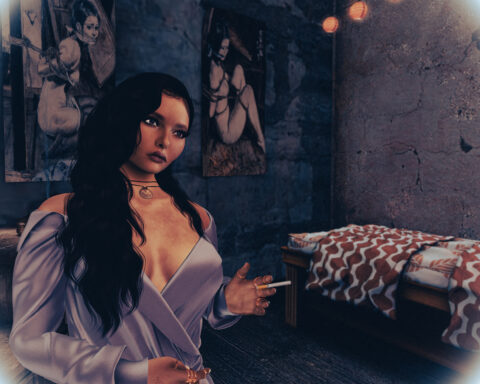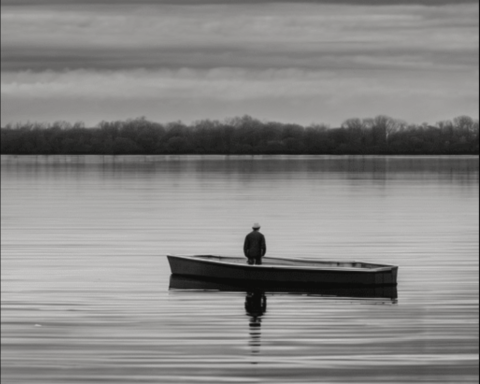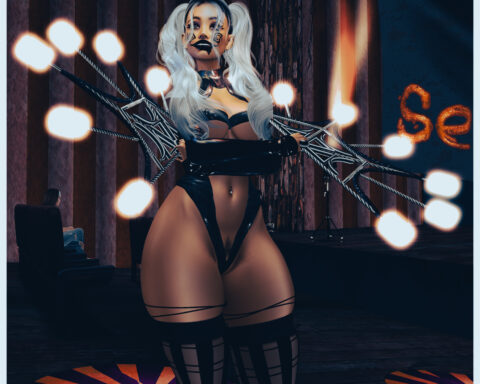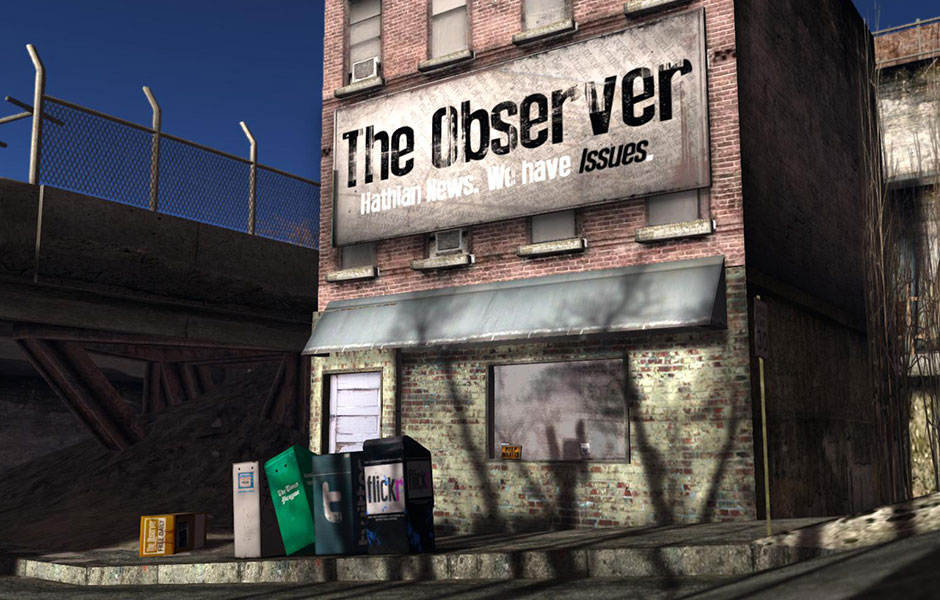Two figures sit in Lou’s Bar, poised like some Dutch Mannerist portrait painted by Rembrandt and dreamed up by cyberpunk godfather, William Gibson. One is a small, run-down woman; filthy black shirt and numerous scars stretched over her ungainly, pregnant body. This is Misti Ruska, and she is even more full of complaints than she is of alcohol, nicotine and unborn child. The other figure wears a beret, a gas mask and leather clothing likely stolen from the costume department of ‘The Matrix’. He is a man of deliberate mystery. This is Vicious Sparrow.
And for good or ill, Vicious Sparrow is the first father of Hathian.
He is new in town, but not new to town. Wherever he came from before, Sparrow was one of the first major crime figures to arrive in Hathian to make his mark. Make it, he did. Sparrow has presided over no less than three of the major criminal dynasties in Hathian. He led a riot that burned down the police department and the jail. He personally tangled with every one of the luminaries in Hathian history – Bebe Pink, Tusken, Will Clementine; all the names that scream loud enough from the headlines to send chills down a local reader’s spine. He is regarded by some as a pathetic madman and by others as near to a demigod.
It is clear, today in Lou’s, how Misti Ruska sees him. After their hug – a reunion after several years – they settle on the barstools with Misti’s body turned toward him. There is no failing to see the magnetism he holds over her. It is the same magnetism that drew the largest gangs to him, from scratch three times over, and led them in fanatical charges against the most atrocious of criminals.
The only one who doesn’t see it in this room is Vicious Sparrow. Or so he would have us think.
It becomes clear, from when he begins to answer my question as to why he formed Cerberus – a gang that, like his other major dynasty, The Saints, was intended to guard the populace from brutality – that he enjoys his mystery.
Like a father hiding his approval or disapproval behind a newspaper, reserving it for the time when it will be most powerful, Vicious Sparrow conceals himself behind a screen of ideals and enigmas.
“The Cerberus.. was joined due to an unequality in the make up of Hathian’s … groups. ” Sparrow tells me. “Most of these gangs originally were bonded to either coordinate to more criminal ambitions .. and what we are.. a counter reaction to such actions.. grouping of like minded people for protection… we fall in the second category…”
Misti clearly is puzzled by this answer. Hers was more along the lines of how Cerberus might have been explained to a newly arrived waif or a recently beaten boy they were trying to recruit: That the gang was there to get back at the abusers and rapists running wild in Hathian.
Sparrow’s response is not in the language of the streets, but in that of philosophers; of deeper thought. Like the ancient myths, he maintains this mystique because mystique is powerful. It makes people wonder; it draws them in. And it keeps them under control.
I ask if Cerberus accomplished their mission: If it kept the people safe. Misti replies.
“At times we did it right.. sometimes we managed ter tip de balance.. but it’s just weighed so ‘eavy against us… ‘ard ter keep up.”
Vicious then has his say: “Sometimes it encouraged more… actually.. as in the case of the Militia.. who looked for a bigger target to go after.. there were times when we did truly feel we were protecting Hathian.. but other times.. we were convenient .. like bait.. but that too could be considered a victory. If the bad guys messed with us.. they wouldn’t have time to mess with the common unaligned person.. would they?”
The smell of burnt offerings is clear in the air – a smell of shared sacrifice and shared tragedy between these two scarred figures. I am left wondering who the sacrifices were for. Were they really for the sake of Hathian’s citizenry?
I ask if they did whatever was necessary to achieve their aims. I want to know if they fought as brutally as their enemies. If not, then it stands to reason that Cerberus – and Vicious Sparrow – had aims more necessary than simply defeating the gangs.
Misti responds first:
We didn’t do what dey did. Dey took children, dey threatened ter kill a child a day. Dat Will ‘e give me teeth of de kiddies ‘e ‘ad attacked. No, never were we ‘as bad as dem. No children involved, ever. N’ no rapin’.. no kidnappin’s. We fought wiv our ‘ands n’ our guns. We made an ‘oly war! We ‘ad God behind us.”
She clasps her crucifix. Again, I think on martyrdom, and notice all the wounds on her – the scars, the pregnancy, the drunkenness. She is suffering so much. For what, I wonder.
Sparrow answers me, in part. “Perhaps it is our failing.. but we could never go as far as they did … perhaps to the edge.. but never to plunge into the dark depths as they… to do so would be to lose what we are… at our core.
“We held ourselves to idea.. to be the ones who could stare God in the eye after all of it was done.. and say ‘yeah.. we fought.. but we fought with our souls intact’. It was for the people… even if they didn’t know or care for it… ”
There is every record to support Sparrow and Ruska’s assertion that they never sunk to the level of the gangs that they sacrificed in opposing. Stories of Cerberus tell of how they did not torture or rape; how they diligently policed their own ranks to keep moral standards intact.
Parnell Urquhart, Hathian’s other patriarchal figure, does whatever is necessary to protect his family. And there is no doubting that Misti, and many others, had just such a family bond with Sparrow. But Sparrow, their father, made it necessary for his flock and him alike to sacrifice themselves for the sake of a moral higher power.
I ask what that sacrifice demanded.
Vicious mumbles a reply first. “I was shot a few times… I was shot several times in the leg by Tusken.”
“I aint got no idea ter be ‘onest…” Misti tells me. “Five.. six times.. sometimes by de cops, sometimes by de gangs. Will, ‘e wus de Rejects leader in dem days, ‘e weren’t big on shootin’. ‘E liked ‘is sword.. n’ ‘is teeth.” She touches a scar on her neck that is testimony of this. She shudders.
I ask after times of joy – if Cerberus had cause to celebrate, if not to be celebrated. For Vicious Sparrow is only partially clear in his depiction of Cerberus’ legacy: Some people do remember them as a force for good, and care.
Word on the street has it that Cerberus is gathering again. In the pasty light and vinyl smell of the Comic Book store, where four-color heroes fight a tireless battle against evil, Vicious Sparrow’s gang is said to meet. It is populated by former police, by gang members who want an ethical alternative to the unending savagery of turf war, and by civilians simply sick of being preyed on.
But the bodies are still stacking up in the morgue. Torture and mutilation are endemic. And when one looks into the crime waves of Hathian, studying its tides, another pattern becomes clear: That when Cerberus roamed the streets, there were more shootings and homicides than ever before.
I consider this record as I look over the two poised figures, considering their mythology. They are as covered with suffering, defined by pain, as anyone in Hathian. Vicious Sparrow defined their character – a mentor to Misti, a leader to Cerberus, a saint to a Hathian looking to wage a crusade against depravity and fear of the gangs. And if that crusade only led to greater violence, counter to the stated purpose of Cerberus, what end was it really serving?
Vicious and Misti talk on friends lost for this mysterious cause – of a young mother, Lanie, killed in their ranks. I ask Misti if Cerberus is necessary now.
“Fer me, no.” She replies. “It’s a desparate fight, one dat de Cerberus won’t ever win. It ends in tragedy, it’s too much pain. It aint necessary. Yer gotta look after number one now. De others gotta look after ’emselves.”
She continues: “We won so many little battles, but de war against evil aint ours ter fight no more. Well, it aint mine anyhows.. guilty as dat makes me cus if yer aint standin’ wiv good yer standin’ against it. But, I’ll speak wiv God on dat when I’m done in dis life. It don’t always end in tragedy but when it all ends.. its de tragedy dat yer remember. De faces of yer friends who ‘ave fought wiv yer.”
I wonder again to myself, louder, whether it was truly about protecting those faces. So many in Cerberus suffered worse for being in it. As Sparrow says, they played the part of bait. But they also played as instigators, acting in aggression against the gangs.
And the distinction to me seems now clear: If the people who joined Cerberus had never banded together, they might have suffered at the hands of the gangs. They would have been martyrs to their own innocence. Instead, they were martyrs to a cause. Crusaders. Sparrow’s crusaders.
Then he speaks answers my question, and in his mysterious way, gives me a look at what really informed his cause – what really directed his authority over a family drawn to him by his magnetism and his ideals.
“As of late.. I wonder if Cerberus needs Hathian…. For all we have done.. no one remembers… ” Sparrow says, “We may go down.. but I still remember the face of my father.. and the people I call family in the Cerberus… and that’s enough for me to go on. ”
But protecting his family was not necessary enough for him or Cerberus to do all it could. It never tortured or used terror tactics. Their necessity was a moral necessity. It was not about protecting people’s lives. It was about protecting their souls.
Vicious rises up wearily. He has an errand to see to. He is different than Parnell in this. Parnell did not want to expose his pain, his vulnerability to me.
Vicious Sparrow wants me to know he is suffering. He wants me to know he works tirelessly for this suffering.
And this is the soul of Cerberus, I see: The soul of the martyr; of Vicious Sparrow. He suffers gloriously. Others, feeling themselves to be suffering as well – as victims – seek him out to make their suffering have some value, some worth. The reward he gives is to invest the value of mythology in their deeds and to polish it with a moral veneer.
He gives me some parting words that make this veneer, this armor, clear:
“Even Achilles.. had scenes of farmers and peasants at work upon his shield… Misti may have lost her way.. but as surely as I stand to what oppresses her.. I will not forget that I fight for her.. ”
‘Lost her way.’ I think on this. I look at the agonized woman, pregnant and needy and in terrific pain. And she looks sad that she no longer will sacrifice herself for Vicious Sparrow.
As he leaves, I reply to him in the language he best understands: Not the bullet wounds and friends’ bodies and burning buildings that he has inured himself to. Not that real, fleshy, material language of loss and pain. I speak him about myths.
I remind him that Homer, the Greek poet who wrote of Achilles’ virtue in sacrificing himself and others for glory, also wrote of another kind of virtue: That of Penelope, the wife of a Greek soldier 20 years gone from her, who protected her bed from suitors. Penelope, who looked to her family first, above all other necessity – comfort, riches and, yes, even sacrifice for glory.
He goes into Hathian thinking on this. And he fits there, just as Parnell fits. Hathian is a place of pain.
The pain of Hathian’s ruling father, Parnell, is the pain of a man who does whatever is necessary for his family.
But the pain of Hathian’s first father, its father returned, Vicious Sparrow, is distinctly different. It is the pain that believes itself to be glorious. He too does what is necessary for this idealized pain – he destroys, he sacrifices, he labors tirelessly. In the end, what is necessary for him and his followers is to believe their pain is glory.
It is no mistake that Misti grabbed the figure of Jesus, who died for the world’s sins, when she spoke on Vicious Sparrow’s cause. It is no accident that Vicious Sparrow sees himself as a modern Achilles who, given the choice between tending a family and sacrificing sons and daughters for his glory, chooses glory. It is a deliberate decision to believe that the pain they suffer and cause is worth more than what it actually is.
Vicious Sparrow is back in Hathian, and to look at him is to see his suffering. What he suffers worse is not the agony he has suffered or the agony he will cause.
He suffers worst, as he says, when he thinks the value of all that agony is forgotten. When he thinks that the glory of it – the legend – might not be believed.
This much is certain:
Like a stern father, he will suffer the pain of inflicting punishment in order to inflict the lesson he has decided Hathian must learn. He will continue to feed Hathian’s suffering until it knows its father’s face.
And that face will be the face of Vicious Sparrow.

